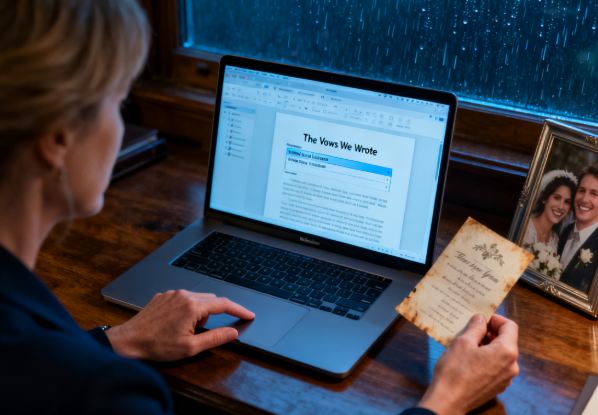
The discovery was an accident, a fleeting moment of digital housekeeping. You were cleaning out your cloud drive, archiving old vacation photos and tax documents, when you saw the file: “Our_Vows.docx.” A smile touched your lips. You hadn’t looked at it since the wedding day, five years ago. You clicked on it, not to read the words, but to check the file size before moving it. And that’s when you saw it.
The “Last Edited By” field didn’t show your name, or your spouse’s.
It showed: “Rev. Michael Adams.”
The smile vanished. Reverend Adams was the kind, elderly pastor who had married you. He’d given you a template, a starting point. But the vows you’d spoken at the altar, the words that had made your guests weep and your own hands tremble with emotion, were yours. You’d spent weeks crafting them, trading drafts late at night, weaving inside jokes and profound promises into something uniquely you.
Seeing his name there felt like a violation. It was a tiny, digital crack in a sacred memory. Had the Reverend rewritten them? Had your spouse, unsure and seeking approval, sent them to him for editing without telling you? The purity of that moment—the most honest words you’d ever spoken to each other—felt suddenly staged, sanitized, and false.
You carried the unease for a day, the question gnawing at you. Finally, that evening, you couldn’t hold it in.
“I was cleaning out the cloud drive today,” you began, trying to keep your voice casual. “I saw our vow file. It says it was last edited by Reverend Adams.”
Your spouse looked up from their book, their expression unreadable. Then, a slow, soft smile spread across their face. They got up, went to the desk, and pulled out a small, locked firebox. You’d never known the combination. They opened it and retrieved a single, creased piece of paper, handing it to you.
It was the original printout of your vows, the one you’d held at the altar. The paper was worn, the ink slightly smudged. In the margins, in Reverend Adams’s shaky handwriting, were notes.
Next to your promise to “always save you the last bite of dessert,” he had written: “A perfect, human detail. This is the stuff of a lifetime.”
Beside your spouse’s vow to “be your anchor in every storm,” he had scribbled: “Powerful. True. God is in these words.”
At the very bottom of the page, he had written a final note: “I have presided over 1,422 marriages. I have never seen a more perfect, more true expression of love. With your permission, I have saved a copy of this document to my personal drive. I read it when my faith in the institution wanes. It reminds me of what is possible. Thank you.”
The wedding vows you wrote together are saved on a cloud drive last edited by your reverend because he wasn’t correcting them. He was preserving them. He wasn’t the editor; he was the first witness. His name was on the file not because he had changed a single word, but because he had saved it as a digital relic, a testament to the faith he found in your love. The last edit wasn’t a revision of your promises; it was his final, silent act of the ceremony—an act of blessing, and a confession that your love had, in turn, renewed his own.
You looked from the handwritten notes to your spouse’s face, and the digital crack you’d felt was sealed with a gold stronger than any cloud storage—the realization that your vows were so powerful, they had become someone else’s prayer.